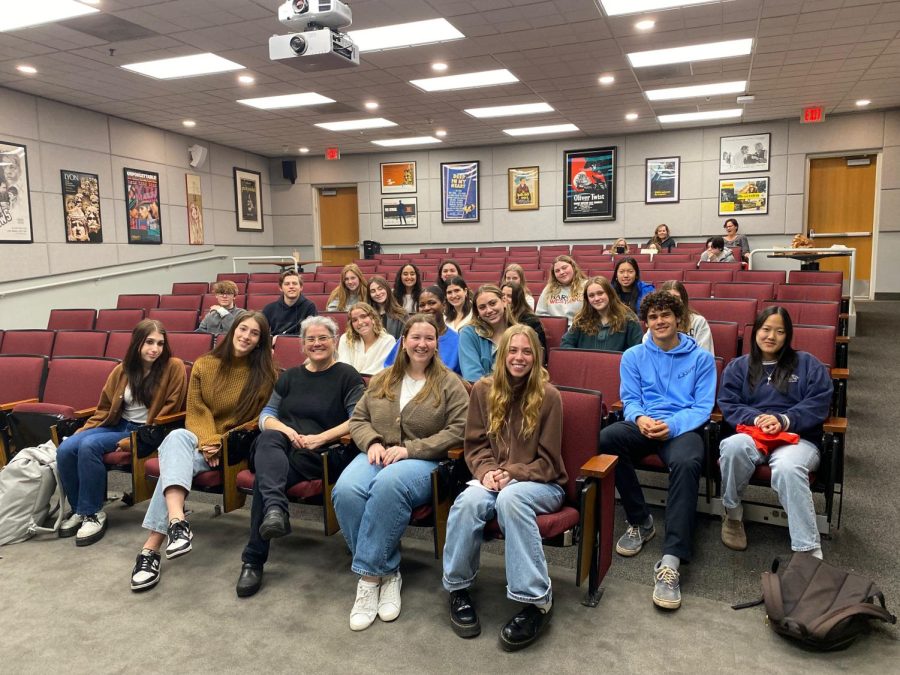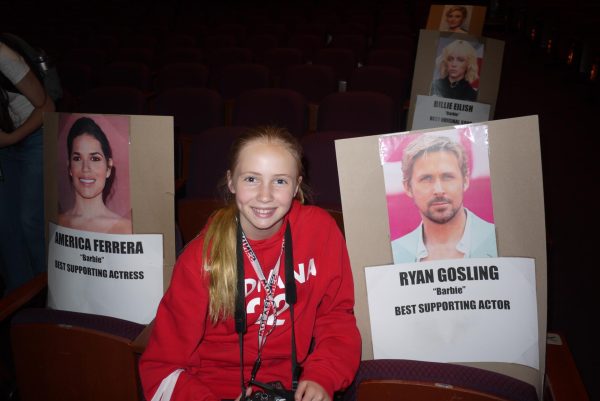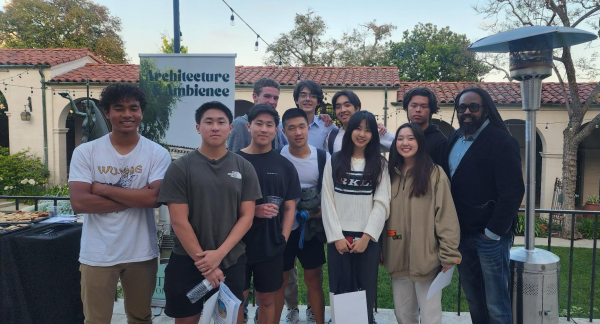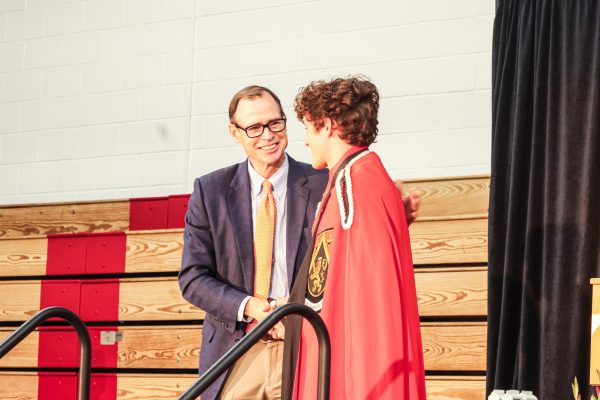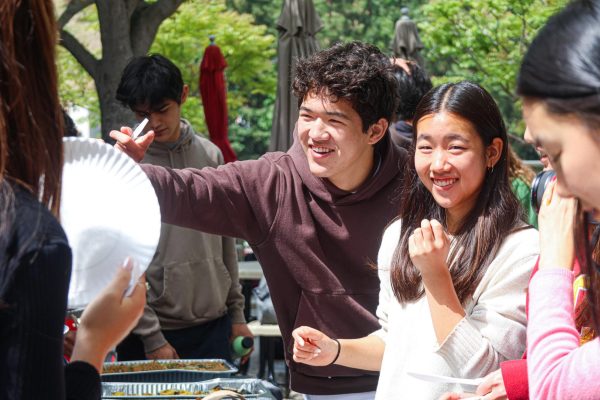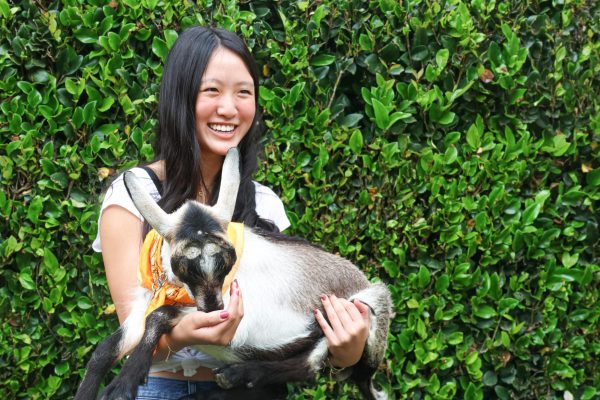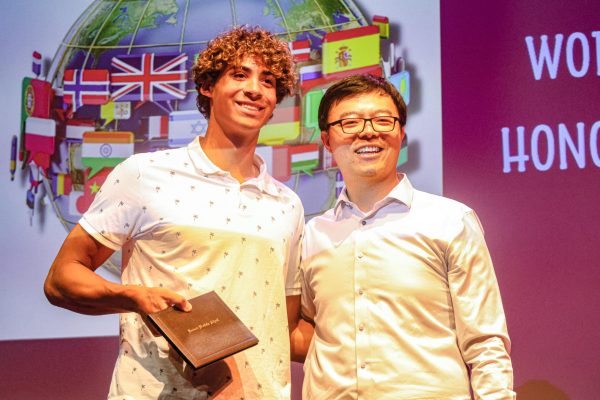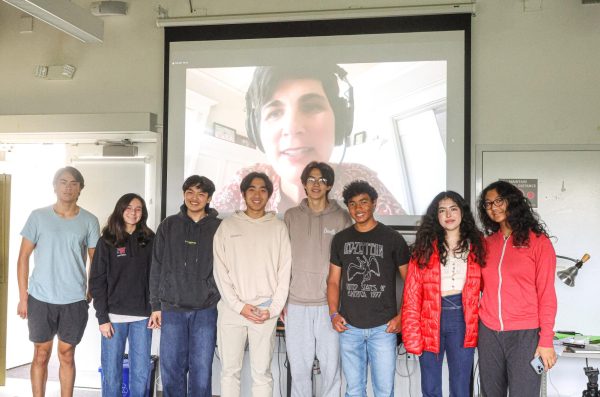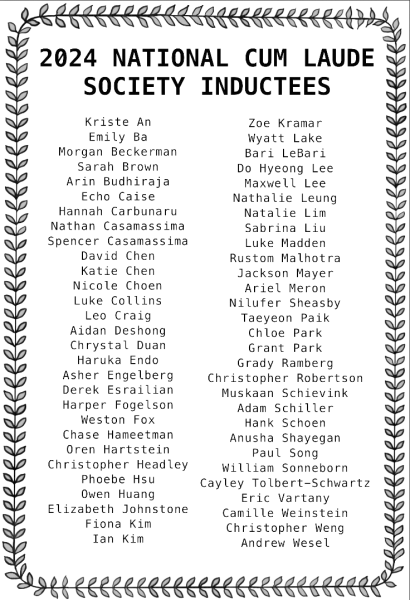School hosts Nobel Laureate and astrophysicist Andrea Ghez
Kutler Center Scholar in Residence Andrea Ghez poses with EMPOWER. Ghez won the Nobel Prize in Physics for discovering a supermassive blackhole at the center of the Milky Way galaxy.
March 22, 2023
The Kutler Center hosted the 2020 Nobel Prize in Physics winner Andrea Ghez (Evan ’19, Miles ’24) as the 2022-2023 Scholar in Residence March 14-16. Ghez spoke at community-wide events and visited numerous physics, journalism, business and Kutler Center classes during her stay.
Ghez is a professor of Physics & Astronomy at the University of California, Los Angeles (UCLA) and the Lauren B. Leichtman & Arthur E. Levine chair in Astrophysics. In 2020, she became the fourth woman to receive the Nobel Prize for Physics after discovering a supermassive black hole in the Milky Way’s galactic center.
The Scholar in Residence program, founded by Former Performing Arts Teacher Ted Walch, seeks to enhance students’ experiences by inviting scholars on campus for three days to share their expertise, according to hw.com.
Director of Kutler Center and Summer School Programs Jim Patterson said the Scholar in Residence program serves as not only an important reminder of Walch’s legacy, but also allows students to directly learn from experts.
“Ted Walch, who was a founding member of the Kutler Center, came to me one day and said ‘One of my former students is going to be in town, I wonder if he could visit some classes. He happened to work on the Human Rights Watch for a number of years,’” Patterson said. “We had him visit classes over the course of a few days, interact with students, tell his story and answer questions. We discovered that the experience of bringing somebody in who has a particular expertise and [having them] interact with students on an intimate level was a really powerful experience. It’s been a terrific program for us over the years, as we’ve had artists, historians and scientists from all over the country.”
Ghez said she accepted the invitation to become the Scholar in Residence because it was a perfect opportunity to give back to the community.
“I’ve had two kids go through Harvard-Westlake and am super grateful for the amazing education that [my] kids get here,” Ghez said. “So, in some sense, this is my way of giving back. We can all have different ways of giving back, but this is a way in which I could do that in a meaningful way.”
Ghez, who attended the University of Chicago Lab School, said her love for astrophysics came from her high school science experience, motivating her to also inspire today’s high schoolers.
“I’ve always felt really strongly about the importance of role models in terms of encouraging a more diverse set of scientists,” Ghez said. “High school is a really critical point for teens in their education. The main priority is continuing to open up your understanding of what’s possible. It’s really important for young men and women to see that scientists don’t always look the same. By the time I reached [the California Institute of Technology], there were very, very few women in physics, so it became really clear to me that [I needed] to commit to being a visible role model.”
Jackson Adams ’24, whose Physics I class was visited by Ghez, said an outside expert in physics allowed him to get a sense of what academia is like.
“We ended up talking primarily about black holes, but also her journey to discover the scientific method,” Adams said. “I was inspired by the advice she gave on how to pursue my own path in science. It really opened up my eyes to what the field is truly like.”
At an event with HW Empower, Ghez said she hopes to inspire women to pursue STEM topics, despite it being a male-dominated field.
“I still do all my teaching at the undergrad level, the very first introductory classes, because that’s where [being a] female role model has the biggest impact,” Ghez said. “You have power in being an outsider, in proposing new ideas. At every stage, someone has always said ‘No, you can’t do this because you’re a girl.’ I got very used to ignoring when people said I couldn’t do something. There were times when people didn’t believe our approaches would work. I was pretty well trained by then to believe in myself.”
Rheanna Vradiy ’25, who attended the HW Empower event, said Ghez inspired her to explore her interests, no matter what they are.
“I’m still deciding on what I want to do in college and I wanted to see in what direction she took her life with this particular interest,” Vradiy said. “I am interested in astrophysics, but I also just wanted to hear about a women’s perspective in a male-dominated field.”
Stanford University Professor Dr. Carolyn Bertozzi is the 2022 Nobel Prize in Chemistry winner for the development of click and bioorthogonal chemistry. Ghez said she is looking forward to what this might mean for the future of women in academia.
“It’s so exciting, and it reflects where the field [of science] is,” Ghez said. “It’s a strong message to the next generation that we’re at a position where we’re at a point in time where there are a lot of different kinds of people doing science, and it’s really important to recognize all the different kinds of people who are contributing in meaningful ways.”
In a community-wide Q&A session with Ghez and Patterson on March 14, Jon Kutler, who worked to develop the Kutler Center, said he was amazed by what the Scholar in Residence program has achieved.
“Whenever I come here for these events, it just makes me spellbound and just awed by what parents and alumni and faculty can do for the Kutler Center,” Kutler said. “It is just a unique way to bring together people and introduce in different ways those who think differently. And, it’s just so exciting.”































